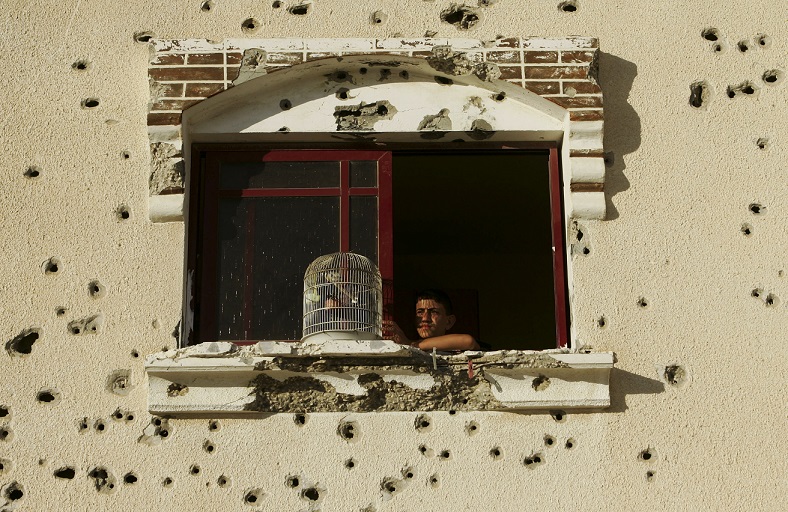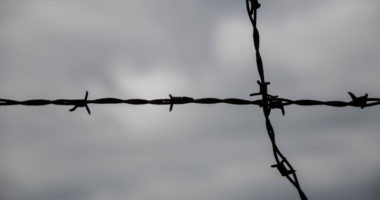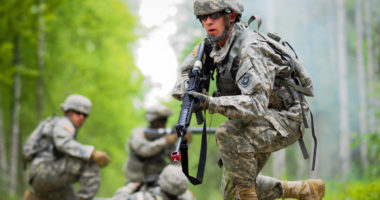Armed conflicts have long-lasting repercussions on the population affected, even after the conflict has ended. Humanitarian organizations operating in these settings can alleviate the suffering and contribute to the enjoyment of human rights. To do this, their activities must be facilitated, and their personnel protected at all times.
In this post, part of our series ‘IHL in the aftermath’, ICRC Legal Associate Émilie Charpentier outlines the legal framework that applies to humanitarian activities during and after armed conflict and proposes legal solutions to the challenges humanitarian organizations face when trying to fulfill their mandate.
In the aftermath of a conflict, the civilian population is left gravely affected: families are separated, infrastructure is destroyed, people have sought refuge in other countries or are internally displaced, and there are many wounded and sick. People are still in dire need of assistance and protection. The community is the first responder, and then the State, or whoever controls the territory. But if these actors do not have the capacity, humanitarian organizations can step in and they thereby become a key element to the full recovery of the civilian population in the aftermath. It is essential that they remain protected.
However, humanitarian actors worldwide, such as, but not only, the ICRC, face challenges such as insecurity, administrative impediments created by States and non-State actors, and risk of arrest and prosecution for discharging their mandate where counterterrorism penal laws and sanctions regimes are strict or do not contain humanitarian exemptions.
Under both international humanitarian law (IHL) and international human rights law (IHRL) States always have the primary obligation to meet the needs of the population under its jurisdiction and control. This flows from the principle of State sovereignty, general international law and the human rights obligations of States. As provided by the Guiding Principles in the UN General Assembly resolution on Strengthening of the coordination of humanitarian emergency assistance of the United Nations, this primary obligation includes the role of initiating, organizing, coordinating and implementing humanitarian assistance within its territory.
In situations of armed conflict, IHL provides a strong framework for humanitarian access and activities. However, in other situations of emergency or during the transition period after the end of an armed conflict, the question arises whether general international law and IHRL also place obligations on States to accept and protect such activities. The line between armed conflict and peace is, in reality, not so sharp. In the aftermath, the effects of the conflict are still vivid and require a humanitarian response to ensure a true transition toward peace and end of human suffering as a result of the conflict.
IHL protection during and after the conflict
Under IHL, impartial humanitarian organizations have the unrestricted right to offer their service to the parties to answer the basic needs of the population affected by an armed conflict. The authorization to give such access is conditional to the consent of the States parties concerned – except in situations of occupation, where there is a positive obligation to accept assistance – but must not be unlawfully rejected, notably if such refusal is likely to endanger the fundamental right of the victims. In addition, in international armed conflicts (IAC) and non-international armed conflicts (NIAC), attacking personnel, material or vehicles involved in humanitarian assistance is considered as a serious violation of IHL and a war crime (Rome Statute, Arts.8(2)(b)(iii), 8(2)(e)(iii)).
In many regions, there is a multitude of parties involved in different armed conflicts. In situations of protracted conflicts, establishing a nexus between certain humanitarian needs and one specific conflict can be complicated since the effects of hostilities are often widespread. Not being able to identify to which conflict a humanitarian consequence is due in multi-conflict settings should not prevent people in need to receive humanitarian assistance and protection.
Even when all armed conflict has ended, there are a number of IHL provisions that are still relevant and applicable in the aftermath – in relation to people deprived of their liberty, or the obligation to care for the wounded and sick. The special protection afforded to humanitarian activities and personnel under IHL thus should still be respected in this regard.
The importance of humanitarian activities to answer all the needs resulting from armed conflict and situations of violence is recognized in the Statutes of the International Red Cross And Red Crescent Movement, which give the ICRC the mandate to operate not only in situation of IAC, NIAC and internal strife, but also to answer the ‘direct results’ of such situations. As provided for in the Seville Agreement, the concept of ‘direct results’ applies beyond the cessation of hostilities and in the post-conflict period, where victims remain in need of relief.
The central role of human rights
During armed conflict, IHL and IHRL are complementary. However, once the armed conflict has ended and IHL stops applying – or applies only in certain cases – IHRL obligations remain. The conflict might be followed by sporadic acts of violence which do not reach the level of organization and intensity to classify as a NIAC, but still create instability and humanitarian consequences. States must make sure that the entire population is afforded the minimum level of fundamental human rights, while actively working toward the full enjoyment of all human rights. Even in situations of emergency, States are obliged to ensure the minimum essential levels of all human rights.
Under IHRL, access to humanitarian assistance is not considered a human right as such. However, facilitating humanitarian assistance is an additional means for States to fulfill their obligation to maintain the essential levels of fundamental rights and the progressive enjoyment of all rights. States also have an obligation to protect all individuals within its territory and jurisdiction on a non-discriminatory basis (ICCPR, art. 2). Therefore, humanitarian personnel enjoy IHRL protection, such as the protection against arbitrary deprivations of their right to life or arbitrary arrest and detention. The importance of international co-operation is highlighted in both International Covenants (the ICCPR and the ICESCR) and resources offered by the international community must be considered as ‘available resources’ when assessing if the State has been taking all the necessary steps to ensure the enjoyment of human rights.
States are under the obligation to safeguard basic fundamental human rights such as the right to life and the prohibition against torture and other cruel, inhuman, or degrading treatment. Unlawful refusal by a State to allow humanitarian access could lead to a violation of the right to life. This would be the case where the population is in urgent need of humanitarian assistance to avoid starvation or severe malnutrition, yet the State refuses to give access while it cannot or will not, on its own, effectively respond to these needs. Denial of essential supplies to populations which are already in a precarious situation due to an armed conflict or situation of violence could not only result in physical suffering but also mental distress.
Even if the full enjoyment of economic, social and cultural rights (ESCR) might be fulfilled over time, it does not prevent the existence of core obligations that must immediately be respected. This is the case for the right to an adequate standard of living, including food, water, housing, and the right to health. The obligation to respect ESCR encompasses respecting already existing humanitarian access that has been granted during the armed conflict and that still contributes to the fulfillment of these rights at the end of the conflict. Indeed, any deliberately retrogressive measures would need to be justified, as the realization of the rights must be progressive.
In its General Comment on the right to food, the Committee on Economic, Social and Cultural Rights emphasized that violations of the right to food can occur through direct action of States such as preventing access to humanitarian food aid. Any limitation on the enjoyment of rights must serve ‘the general welfare of the population’, be in accordance with the law, pursue legitimate aims, and be in line with the principles of necessity and proportionality. The obligation to protect ESCR requires States to ensure that access to humanitarian aid that contributes to the enjoyment of rights is safe and unimpeded. The fulfillment of the State’s obligations might require the adoption of measures and legislation to proactively strengthen the people’s access to means and resources.
Additional protection
Victims of armed conflict in need of humanitarian assistance might also be outside the conflict area – having been displaced or sought refuge, for example. While IHL might not apply where these people are, they are still afforded protection. Indeed, the Convention on the Rights of the Child and the African Charter on the Rights and Welfare of the Child both put an obligation on States to ensure humanitarian assistance for children who are seeking refuge or are refugees and provide for co-operation between the States and international organizations and NGOs.
The Committee on the Rights of the Child stated that States are expected to accept and facilitate assistance offered to meet the needs of unaccompanied and separated children. This is reaffirmed multiple times by the Committee, in relation to the right to education, to adequate standards of living and to health, especially in situations where the State capacity is limited. Moreover, States are strongly encouraged to not only accept such assistance but to seek international assistance. Similarly, the Kampala Convention, which provides for the protection and assistance of internally displaced persons in Africa, contains an obligation to allow rapid and unimpeded passage of relief and to facilitate the role of humanitarian agencies in assisting such persons.
How can humanitarian assistance be facilitated in the aftermath?
It is essential that before and during the armed conflict, parties to the conflict and humanitarian organizations prepare and plan for the aftermath. They must make sure the needs of the civilian population are factored in at all times, otherwise the vulnerabilities resulting from the conflict become more acute and can have long-term implications.
The facilitation of humanitarian activities answering to the direct results of an armed conflict must be based on the needs of the victims, rather than a timeframe. These needs might require immediate humanitarian assistance (such as caring for the wounded and sick after each engagement) but could also be once the conflict has ended (like rebuilding essential infrastructures to ensure access to food and clean water or to education). Long-term humanitarian activities, for instance addressing the fate of missing people, can be crucial for the families and their well-being. This can also impact and influence the social cohesion within communities and ensure a better transition toward a sustainable peace.
States should adopt domestic legislation to facilitate humanitarian activities both in times of armed conflict and in times of peace. As international sanctions’ regimes remain a challenge for humanitarian assistance and post-conflict reconstruction, it should be recalled that the possibility to offer strictly humanitarian aid to persons in other countries, whatever their political affiliation or objective, should not and cannot be regarded as unlawful or contrary to international law. This is reinforced by the general principle of non-discrimination, which is central in both the IHL and IHRL framework, as it is a peremptory norm of international law.
In addition, all resolutions adopted by the UN Security Council in this regard should be interpreted in conformity with the UN Charter and its purpose, which is: ‘promoting and encouraging respect for human rights and for fundamental freedoms for all’. Therefore, national legislation that could impact the enjoyment of certain rights should be adopted in conformity with the general principle of international law and provide for humanitarian exemptions.
In situations of armed conflict, States have clear obligations to facilitate humanitarian activities and to respect and protect humanitarian personnel as provided by IHL and also in accordance with their human rights obligations. When the armed conflict has ended, humanitarian activities play a central role in the life of the affected population and in the post-conflict reconstruction. Humanitarian organizations that work to alleviate the suffering of the affected population, such as the ICRC, must remain protected and their work facilitated as this suffering does not end in the aftermath of conflict.
See also:
- Victoria Riello, ‘Nothing about us without us’: including civilians with disabilities in the aftermath, November 15, 2022
- Christian Cardon, Thomas de Saint Maurice & Kelisiana Thynne, Aftermath of battles and conflict: from challenges to solutions, September 13, 2022
- Kelisiana Thynne, When will it be over? A fictional civilian’s story in the aftermath of conflict, September 7, 2022
- Kelisiana Thynne, Thomas de Saint Maurice, IHL in the aftermath of battles and conflicts: what do we want to achieve?, July 14, 2022






Comments